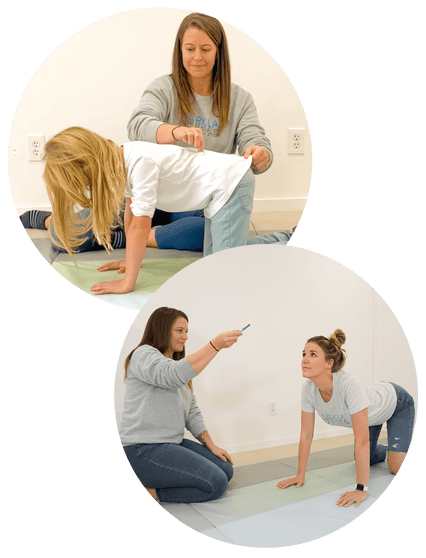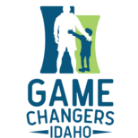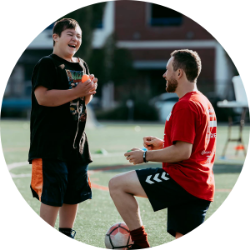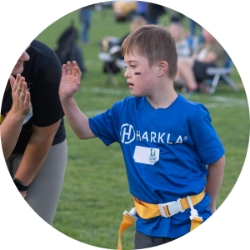Your Cart is Empty
Click Here To See Discounts And Start A Purchase Order!
Learn exactly how to implement functional therapeutic sensory strategies in the classroom to help your student(s) improve focus, mood, behavior, daily functioning skills, learning, and overall quality of life!
$125.00
Learn exactly how to implement functional therapeutic sensory strategies in the classroom to help your student(s) improve focus, mood, behavior, daily functioning skills, learning, and overall quality of life!
“If you are a teacher or a professional working with children within the classroom this course is a must. You will leave with more ideas than you ever imagined and the confidence to make your classroom sensory-friendly for all students, not just those with specific sensory difficulties.”


1 IN 6 CHILDREN HAVE SENSORY PROCESSING DISORDER, AND UP TO 89% OF CHILDREN HAVE AT LEAST ONE RETAINED PRIMITIVE REFLEX
1 IN 6 CHILDREN HAVE SENSORY PROCESSING DISORDER, AND UP TO 89% OF CHILDREN HAVE AT LEAST ONE RE TAINED PRIMITIVE REFLEX
With the rates of Sensory Processing Disorder and Retained Primitive Reflexes rising, we are seeing more and more school-aged children struggling in school and in their daily activities. General sensory difficulties can inhibit their learning, behavior, mood, and quality of life.

What is Sensory Processing Disorder?
Sensory Processing Disorder is when a person struggles with sensory input, like clothing, lighting, or sounds, to the point that it negatively affects their day-to-day activities.
Sensory Processing Disorder is when sensory needs severely impact daily functioning on a consistent basis.
When a child can’t process the messages from the sensory world, they struggle with daily tasks. This includes daily tasks like bathing, using the bathroom, mealtime, self-feeding, dressing and transitions between tasks. It also impacts a child’s ability to learn in school and interact in social situations.
Working with your student(s) with different sensory activities can help them develop a healthy sensory system, which can potentially avoid the detrimental challenges that come with sensory processing disorder.
What Are Retained Primitive Reflexes?
We are all born with primitive reflexes! Developed in the womb, these involuntary movement patterns help newborns stay safe in the brand new, scary world they are experiencing!
These primitive reflexes do not stay forever; they should ‘integrate’, go away or mature, some around 12 months of age, some closer to two or three years old. When a primitive reflex integrates, it makes way for new, more mature movement patterns and higher-level learning to develop.
Oftentimes children don’t get the motor activities they need in order for reflexes to integrate. When primitive reflexes aren’t naturally integrated, they become ‘retained’, leading to anxiety, poor social skills, struggles in school, and more! Development may be hindered, and the infant may not gain higher-level skills.


Students who are struggling with processing sensory input will have a harder time:
Educators
Preschool, elementary, middle, and high school educators.
Therapists
Therapists working in the school setting.
Other Professionals
Those who work with children within the school setting, such as paraeducators.


“As an OT working in the schools, this course is GOLD for both therapists (OT, SLP, PT) and educators! Rachel and Jessica provide the WHY behind classroom behaviors and simple strategies to implement right away! They simplify complex concepts such as sensory processing difficulties and primitive reflexes. Since taking the course, I find myself sharing the resources with teachers and parents daily. 10/10 recommend!”
Shelly Donnelly, School-Based Occupational Therapist






Learn from two passionate CertifieD Occupational Therapy Assistants




Our passion FOR primitive reflexes
We became Certified Primitive Reflex Clinical Specialists (CPRCS) in 2023, although we have over 9 years of experience.Rachel Harrington, COTA/L, CPRCS
Jessica Hill, COTA/L, CPRCS

COTA/L, CPRCS
COTA/L, CPRCS
THIS DIGITAL COURSE IS A 15 MODULE TRAINING WITH 12 HOURS of video, AND 12 contact hours / 1.2 AOTA CEUS (PLUS BONUSES!), ALONG WITH CLEAR INSTRUCTIONS AND FUNCTIONAL STRATEGIES TO IMPLEMENT INTO YOUR SCHOOL IMMEDIATELY TO ASSIST STUDENTS’ FUNCTION, LEARNING, AND DAILY SUCCESS
UPON COMPLE TION OF THIS COURSE, PARTICIPANTS SHOULD BE ABLE TO:

Distant Learning- Independent
PD Provider Name and
Contact Information:
Harkla Co
support@harkla.co
1-844-939-2122
Speakers/Authors:
Rachel Harrington, COTA/L, CPRCS
Jessica Hill, COTA/L, CPRCS
Target Audience:
Introductory-intermediate-level OTs, COTAs, educators, and other pediatric professionals
Note: While many professionals may benefit from the course content, we can only guarantee acceptance of continuing education by AOTA.
AOTA Continuing Education Units (CEUs) and Contact Hours:
12.0 contact hours / 1.2 AOTA CEUs
Time Ordered Agenda: View Here
Educational Level:
Introductory
Disclosures:
Financial: Rachel Harrington and Jessica Hill are employees of Harkla Co. and podcast hosts of All Things Sensory, by Harkla.
Non-Financial: No relevant non financial relationship exists.
Registration Information, Including Special Needs Requests:
Harkla will make accommodations following the Americans with Disabilities Act (ADA). If you require specific accommodations because of a disability, please email support@harkla.co prior to beginning the course to make appropriate arrangements. Requests may also be made by calling Harkla at 1-844-939-2122 Login to your account on Harkla.co to access your course materials, video lessons, post-test, and course evaluation.
PD Activity Completion Requirements:
Record of purchase (recorded automatically by our system and checked when accessing the post-test)
Successful completion of the post-test (≥ 80%)
Attestation statement verifying the learner viewed the webinar in its entirety and completed the post-test independently (included on post-test)
Cancellation Policies:
Canceled By Harkla: This course is not presented live, therefore will not be canceled by Harkla at any time. If you are experiencing technical difficulties with accessing your course materials, please contact Harkla: support@harkla.co
Harkla’s Happiness Guarantee provides full refunds if you are not satisfied with your purchase. Contact support for assistance.
Canceled By Participants: Participants may cancel their purchase at any time before beginning the course and will receive a full refund. Please contact customer service for assistance: support@harkla.co

“This course is amazing! Rachel and Jessica do an amazing job of explaining sensory processing so it’s easy for everyone to understand. Then they provide practical strategies that are easy to implement immediately!”
Jamie Boxer,
School-Based Speech-Language Pathologist
Improve Student Outcomes By Addressing Sensory Challenges
You might have students in your classroom who struggle with sensory processing without knowing it! By providing sensory strategies to the entire class, it will help every student:


LET’S GET STARTED!
Learn exactly how to implement functional therapeutic sensory strategies in the classroom to help your student(s) improve focus, mood, behavior, daily functioning skills, learning, and overall quality of life!

Lifetime Guarantee Learn More
Yes, absolutely! We offer bulk discounting for any purchase of 5 or more licenses. Please click here to access the form for submitting a quote! Or you can email support@harka.co to get a quote as well.
A license to the course lasts for 1 year from the time of purchase. We offer a discounted price for subscription renewals. Please reach out to support@harka.co for more information!
This course is administered via online videos and worksheet downloads that you are able to access through learn.harkla.co once you have purchased!
Like all Harkla products, this falls under our lifetime guarantee. This basically means that if at any time you aren’t satisfied with the course, we’ll refund you right away.
We offer the ability to book a time slot with the instructors for an extra fee, but you are able to comment within courses and get answers to those comments as you go from the instructors.
We also are very responsive on customer support and social media to connect with our community.
Yes! We designed this course with every student in mind, because everyone has a sensory system and can benefit from incorporating sensory-based learning strategies in the classroom! When we provide an inclusive environment that fosters multi-sensory learning, students retain more information and can focus better during instruction.
Although this course was designed for therapists and educators, there are a plethora of resources beneficial for parents as well! Especially for those parents homeschooling their children.
Yes! We include the evidence-based articles we used to create this course, as well as the research we use as pediatric occupational therapy assistants that support our treatment interventions. You can find the resources and references in the last module of this course.
Approximately 12 hours that you can go through and revisit at your own pace!
Preschool through High School aged students.
In order to earn your AOTA CEU certificate you must complete the course evaluation and pass the post-test with 80% accuracy. Then you'll be able to download and print your certificate for continuing education!
Yes! If you select Shop Pay or PayPal while checking out, you will have the option to select a pay over time plan. If you need any help with this, please reach out to us: support@harka.co
Our AOTA-approved digital courses come with a physical workbook - all the digital course PDFs made into a beautifully printed book that we will ship to you. It is the digital course in physical form! You can use our workbooks for quickly referencing and photocopying when needed.
Digital Course Workbooks ship worldwide and take about two weeks for delivery due to processing time
LIFETIME MONEY-BACK COMMITMENT
We don't mess around with our commitment. Unless you are 100% satisfied, we aren't satisfied either. We're a company that truly cares about you and will answer any question or concerns you have.
This means that if you are not absolutely happy with your product, we will not only refund you without question, we will cover the return shipping. There's no reason you should pay for a product you aren't happy with.
1% of all Sales are donated to GAME CHANGERS Idaho


“Game Changers Idaho strives to make an impact benefiting over 400 children with special needs in the grades of K-12 by providing adaptive sports year around in the Treasure Valley. All sports programs (7) are free to all of our families as we seek funding from the community. Harkla has been one of our most dedicated [sponsors], allowing hundreds of children play sports to their best ability! We are so appreciative of Harkla’s support.”
Gabriel Moreno
Executive Director
Game Changers Idaho


